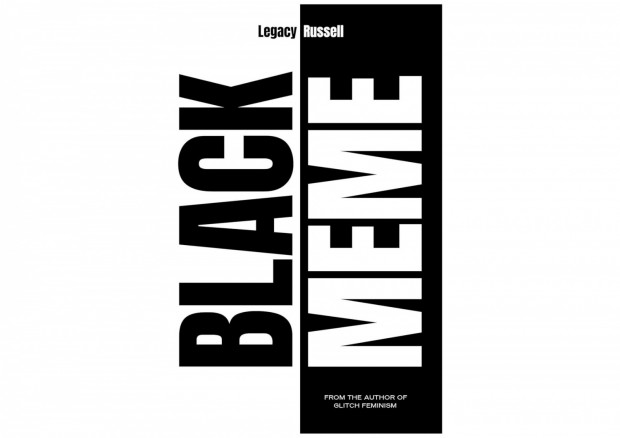Legacy Russell's 'Black Meme' Explores the Influence of Black Culture in Digital Spaces

Legacy Russell's "Black Meme: A History of the Images That Make Us" is a groundbreaking exploration of the influence of Black culture in digital spaces.(Photo : Amazon/Legacy Russell)
Legacy Russell's latest work, "Black Meme: A History of the Images That Make Us," delves into the significance of memes. As a chief curator, Russell brings a unique perspective to her exploration. Her earlier publication, "Glitch Feminism," received acclaim for its fusion of personal narrative, art analysis, and theoretical exploration.
Analyzing Representations of Black Identity
In "Black Meme," Russell examines how Blackness has been depicted and disseminated throughout history. From early film portrayals to contemporary viral videos, Russell scrutinizes the various ways Black identity has been broadcasted and circulated.
She covers a multitude of topics, from the portrayal of Black intimacy in silent films to the disquieting images found in lynching postcards. Similarly, cultural phenomena like "Thriller" by Michael Jackson and the documentary "Paris Is Burning" are also looked into.
A key focus of the book is the significance of Black reaction GIFs in the digital landscape. These GIFs, frequently portraying emotions or reactions by Black individuals, are widely present across various social media platforms. Russell acknowledges the historical influence of figures such as Saartjie Baartman and the unnamed Black jockey featured in Eadweard Muybridge's work, highlighting their impact on visual expression.
Speaking to The Cut, Russell explained that the concept of 'Blackness in itself is memetic' refers to how Black culture, identity, and experiences are inherently influential and pervasive in society. The book explores how Blackness has been transmitted and transformed across various spaces, geographies, and throughout the diaspora, shaping culture and discourse over time.
As a writer and curator, Russell aimed to challenge traditional narratives and definitions of avant-garde culture. As the first Black executive director and chief curator of the Kitchen, she prioritized creating space for marginalized voices and alternative perspectives within the arts.
Russell emphasized the importance of cultural production that embraces radical thought, wildness, and alternative missions, allowing artists to take risks and explore boundary-defying practices. Through her work and research, Russell is dedicated to fostering collaboration and innovation in the arts, empowering artists to push the boundaries of their practice and contribute to the advancement of cultural discourse.
Black Representation in Art and Community
In Interview Magazine, Russell and Jordan Casteel engaged in a thought-provoking conversation about Black representation and its significance in contemporary art. Reflecting on her recent book, Russell questioned the motivations behind portraying Black people and how such representation can propel societal progress. Casteel emphasized the multifaceted nature of Black representation, extending beyond visual depictions to encompass lived experiences and interactions with the environment.
Russel discussed the notion of 'liveness' and its importance in challenging conventional narratives of Blackness. She also explored the concept of slowness in Black representation, advocating for a deeper, more contemplative approach that honors the complexity of Black experiences.
Tackling the significance of Black representation and her connections to Harlem, Russell drew on her father's legacy as a Black artist and photographer who documented the vibrancy of Black life in the neighborhood. She emphasized the importance of representation and archival preservation in capturing the essence of Black experiences for future generations.
RELATED ARTICLE: Tracie McMillan Uncovers the Financial Advantages of Racism on White Americans in New Book 'The White Bonus'
© 2023 Books & Review All rights reserved.
Popular Now
1
Books to Read After 'Fourth Wing': Top Picks for Fantasy and Romantasy Fans

2
‘The Secret Public’ by Jon Savage Book Review: An Insightful Look Into the LGBTQ Influence

3
Stephanie Regalado's 'If They Only Knew' Column Is Now A Book, Unleashing 60 Anonymous True Stories to Empower Women

4
'No Wire Hangers' Scene That Almost Did Not Happen: New Book Reveals Faye Dunaway's Struggles

5
Rare First Edition of Aphra Behn's Novel 'Oroonoko' Discovered in Kent: A Historic Literary Find

Latest Stories
Book Reviews
‘The Secret Public’ by Jon Savage Book Review: An Insightful Look Into the LGBTQ Influence

Book News
Stephanie Regalado's 'If They Only Knew' Column Is Now A Book, Unleashing 60 Anonymous True Stories to Empower Women

Book News
'No Wire Hangers' Scene That Almost Did Not Happen: New Book Reveals Faye Dunaway's Struggles

Book Reviews
‘The Perfect Couple’ by Elin Hilderbrand Book Review: A Captivating Summer Mystery

Book News
New Book ‘The Franchise’ Reveals Penguins President Kyle Dubas’ ‘Biggest Mistake’ as Maple Leafs GM











